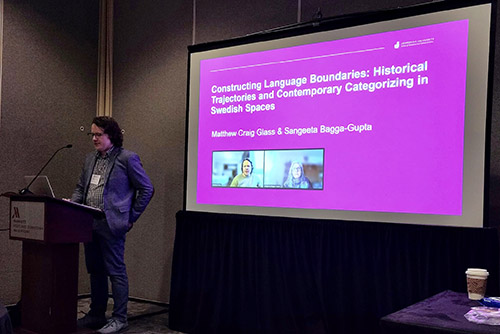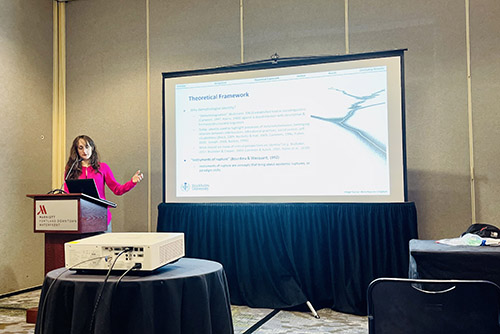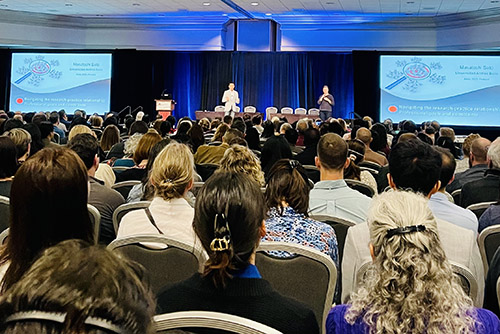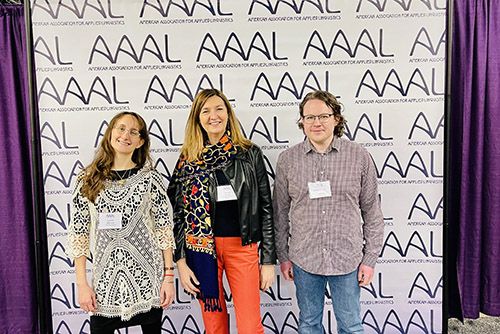Matthew Glass and Scarlett Mannish presented at AAAL 2023
At the end of March, CuEEd-LL PhD students Matthew Glass and Scarlett Mannish were in Portland at the AAAL conference and presented their work.
Constructing Language Boundaries: Historical Trajectories and Contemporary Categorizing in Swedish Spaces is the name of Matthews work.
Read the Proposal Abstract
Languaging is a fundamental dimension of human social existence and this includes scholarly language practices that are complicit in creating world-views. This paper presents a pilot study that has explored the developments of the scholarly field of historical linguistics and non-specialist, cultural notions about language and language history. Researching the historical trajectory of words and (named-)languages constitutes a fruitful endeavor to illuminate conceptualizations of language and language history. How does someone uncover the history of a (named-)language or key linguistic words? Are certain ideologies being espoused, explicitly or implicitly, in language scholarship or related to cultural norms and practices?
This paper builds on reflexive tenets that call attention to the importance of recognizing and tracing the geneses of scholarly practices and their effects on how research is carried out, findings are articulated, how these shape society at large, and how circulating discourses feedback into scholarly thinking. Trajectories of the establishment of categories related to the named-language Swedish, some named versions of Swedish that have emerged in the educational sciences, and specific words that have become central in the language sciences in contemporary times were undertaken by tracing their evolution backward. The following words functioned as initial points of departure, augmented by a gaze towards theories about language families: tvåspråkighet (bilingualism), flerspråkighet (multilingualism), and translanguaging through the study of the following materials: popular scientific podcasts that focus on language, historical and current etymological dictionaries, and course syllabi in Swedish teacher education.
By engaging with historically produced and ongoing productions of (named-)language categorizations, our findings point to the origins and trajectories of boundary-marked historical linguistic concepts. The value of such explorations lies in how the findings disturb reductionism inherent in contemporary conceptualizations of language and language concepts by juxtaposing specific cases from across time in a specific geopolitical space, i.e., Sweden.
Demythologizing “identity” in Swedish minority language education is the name of Scarlett Mannish work.
Read the Proposal Abstract
This paper proposes a demythologizing of the concept of “identity” through a demonstration of its problematic implications for minority language education in Sweden. It presents a historical analysis of Swedish language policy, which entitles children raised speaking a language other than Swedish to state-mandated mother tongue instruction (MTI). I explore how post-war North American theories about minorities and identity were used by key agents in the 1970s in anti-assimilatory arguments for the inception of MTI, and how modern research from the same region, such as that of Cummins (1996), Gay (2000), and Norton (1995), contributes to the present-day proliferation of the word “identity” in school curricula. By drawing on policy documents and relevant literature, I show that the existence of MTI has continuously been justified through appeals to either the cognitive/instrumental benefits of bilingualism, which are uncertain, or its identity forming benefits. I argue that these appeals represent a troublesome binary that limit the discussion of the positive benefits of MTI. A viable way forward, I hold, is to demythologize “identity”, as it “bears a multivalent, even contradictory theoretical burden” (Brubaker, 2004) and is a hypostatization of an imaginary self rather than a concrete set of tangible behaviours. Tying together language and self as a means of resisting hegemony by belonging to a supposed bounded and exclusive minority group falls foul of the same logic used by the hegemony itself. Furthermore, given the persistence of far-right rhetoric in Europe and elsewhere, the justification of MTI through appeals to preserve ‘non-Swedish’ identities is sensitive to a changing political climate of opinion on integration and assimilation. Basing arguments for inclusive education on ‘identity’ is therefore short sighted if the aim is to maintain or boost the legitimacy of MTI as a space for non-hegemonic language practice.




